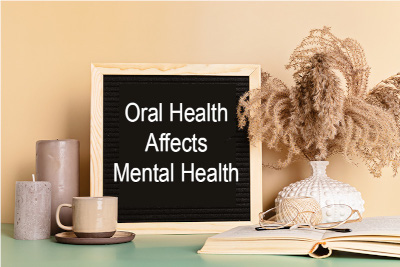The Connection Between Oral Health and Mental Well-Being
Mon, Feb 10th, 2025
When most people think about oral health, they focus on preventing cavities, gum disease, and bad breath. But did you know that the state of your teeth and gums can also affect your mental health? Research shows a strong link between oral health and mental well-being, influencing everything from self-esteem to anxiety levels.
If you’ve ever felt self-conscious about your smile or experienced dental pain that impacted your mood, you’re not alone. In this article, we’ll explore the deep connection between oral health and mental well-being, revealing how taking care of your teeth can also help improve your emotional and psychological health.
1. The Psychological Impact of a Healthy (or Unhealthy) Smile
Confidence and Self-Esteem
Your smile is one of the first things people notice about you, and it plays a significant role in self-esteem and confidence. People who feel good about their teeth are more likely to smile freely, engage in social interactions, and present themselves confidently in personal and professional settings.
On the other hand, those with visible dental issues—such as missing, stained, or misaligned teeth—often experience self-consciousness and may avoid smiling altogether. This can lead to social withdrawal, reduced self-confidence, and even symptoms of depression.
A study published in the Journal of Clinical Periodontology found that people with poor oral health were more likely to report feelings of dissatisfaction with their appearance, impacting their overall happiness.
The Social Stigma of Dental Issues
In today’s world, where social media and first impressions matter more than ever, a healthy smile can influence how others perceive you. Unfortunately, individuals with significant dental problems may face social stigma, affecting their personal and professional relationships.
This social pressure can lead to avoidance behaviors, where people skip social events, job interviews, or even dating opportunities due to embarrassment about their teeth. Over time, this avoidance can contribute to loneliness and increased anxiety.
2. How Poor Oral Health Contributes to Anxiety and Depression
Chronic Pain and Mental Health
Dental problems like tooth decay, gum disease, and temporomandibular joint (TMJ) disorders can cause chronic pain, which has been linked to increased stress, anxiety, and depression.
- Persistent toothaches or jaw pain can disrupt sleep, making it harder to rest and recharge
- Gum disease has been associated with increased levels of inflammation, which is also linked to mood disorders like depression
- People with chronic pain are more likely to develop anxiety disorders due to the ongoing discomfort and disruption to their daily lives
A 2020 study in the journal Psychosomatic Medicine found that individuals experiencing chronic dental pain were more likely to report higher levels of psychological distress and reduced quality of life.
The Fear of the Dentist (Dental Anxiety)
For many, going to the dentist is a nerve-wracking experience. Dental anxiety affects up to 36% of the population, with some individuals avoiding dental care altogether due to fear.
Ironically, this avoidance can make dental problems worse, leading to more severe issues down the road. The longer someone delays treatment, the more extensive (and potentially painful) procedures they may need, reinforcing their fear and continuing the cycle.
If you or someone you know struggles with dental anxiety, modern sedation techniques and gentle dentistry approaches can help make visits more comfortable.
3. The Biological Link Between Oral Health and Mental Well-Being
Gum Disease and Brain Health
Recent research suggests that gum disease (periodontitis) may be linked to cognitive decline and mental health issues.
- Studies indicate that inflammation from gum disease can contribute to brain inflammation, potentially increasing the risk of Alzheimer’s disease and other neurodegenerative conditions.
- The oral microbiome (bacteria in the mouth) is directly connected to the gut-brain axis, which influences mood, cognition, and overall well-being.
- A study in Nature Reviews Neurology found that individuals with severe gum disease had a higher likelihood of developing depression and anxiety disorders.
Nutrient Deficiencies and Their Impact on Mood Oral health issues can also affect your ability to eat certain foods, leading to nutrient deficiencies that impact mental health. For example:
- Vitamin D deficiency, often linked to gum disease, has been associated with depression
- B vitamin deficiencies, which can result from poor diet or oral pain limiting food intake, are connected to mood swings and increased stress
- Iron deficiency, common in those with bleeding gums, can contribute to fatigue and feelings of low energy
Ensuring you have a nutrient-rich diet and maintaining good oral health can help prevent these issues
4. Tips for Improving Both Your Oral Health and Mental Well-Being
Taking care of your mouth can do wonders for your mental health! Here are some practical steps to help: Prioritize Daily Oral Hygiene – Brush twice a day, floss regularly, and use an antibacterial mouthwash to keep bacteria in check.
- Schedule Regular Dental Checkups – Catching small problems early can prevent bigger (and more expensive) issues later.
- Manage Stress Levels – High stress can lead to teeth grinding (bruxism) and TMJ issues. Try meditation, exercise, or deep breathing to relax.
- Address Dental Anxiety – If fear of the dentist is holding you back, consider sedation dentistry or talk to your dentist about pain-free options.
- Eat a Nutrient-Rich Diet – Support both your mental and oral health with foods rich in calcium, vitamin D, and omega-3 fatty acids.
- Smile More! – Even forcing yourself to smile can trick your brain into releasing dopamine and serotonin, boosting your mood!
Final Thoughts
The connection between oral health and mental well-being is stronger than many people realize. A healthy mouth can lead to a healthier mind, improved confidence, and a better overall quality of life.
If you’ve been neglecting your dental care due to anxiety, pain, or self-consciousness, now is the time to take action. A beautiful, healthy smile isn’t just good for your teeth—it’s good for your happiness, self-esteem, and long-term well-being.
Ready to prioritize your oral and mental health? Schedule a dental checkup today and take the first step toward a happier, healthier you!
Call Arnold Dentistry today! (813) 689-1529






